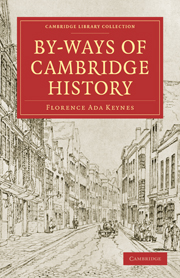Book contents
- Frontmatter
- PREFACE
- Contents
- ILLUSTRATIONS
- Introductory
- Chap. I The Guildhall and the Market Place
- Chap. II The Office of High Steward of the Borough of Cambridge
- Chap. III Cambridge Waits and Orlando Gibbons
- Chap. IV Barnwell Priory and the Old Abbey House
- Chap. V Why Oxford comes First. A Problem in Precedence
- Chap. VI Damaris Cudworth.—A Cambridge Woman of the Seventeenth Century
- Chap. VII A Town Plan for Cambridge in the Eighteenth Century
- Chap. VIII Mendicity House. Sidelights on Social Conditions in Cambridge in the Nineteenth Century
- Appendix: ‘Cambridge’ as a place-name
- Index
- Plate section
Chap. V - Why Oxford comes First. A Problem in Precedence
Published online by Cambridge University Press: 07 September 2010
- Frontmatter
- PREFACE
- Contents
- ILLUSTRATIONS
- Introductory
- Chap. I The Guildhall and the Market Place
- Chap. II The Office of High Steward of the Borough of Cambridge
- Chap. III Cambridge Waits and Orlando Gibbons
- Chap. IV Barnwell Priory and the Old Abbey House
- Chap. V Why Oxford comes First. A Problem in Precedence
- Chap. VI Damaris Cudworth.—A Cambridge Woman of the Seventeenth Century
- Chap. VII A Town Plan for Cambridge in the Eighteenth Century
- Chap. VIII Mendicity House. Sidelights on Social Conditions in Cambridge in the Nineteenth Century
- Appendix: ‘Cambridge’ as a place-name
- Index
- Plate section
Summary
A CAMBRIDGE PROFESSOR, addressing an Oxford audience, once wittily remarked that the oldest of all Inter-University Sports was a Lying Match. Oxford claimed that it was founded by Mempricius in the days of Samuel the Prophet, and Cambridge retaliated by dating its origin from the Spanish Cantaber in the days of Gurguntius Brabtruc.
The scarce sources of information on the origin of the two ancient Universities certainly left a wide field for fable and imagination, and heated controversy took place from time to time. Ingulph, Abbot of Croyland in East Anglia in the eleventh century, Secretary to William of Normandy, and Peter of Blois, Archdeacon of Bath in the twelfth century, Secretary to Queen Eleanor, Mother of Richard Coeur de Lion, were long regarded as the leading authorities on this subject, but the writings attributed to them have not been able to stand the test of modern research and are now regarded as spurious.
Notwithstanding much research, however, authentic information still remains scanty. The probability is that both Universities arose towards the end of the twelfth century, a time when many men of scholarly tastes were conscious of their ignorance of developments taking place in theology and canon law. Schools to meet their needs were formed in Cambridge and Oxford and became permanent. The earliest Cambridge students would naturally come from the Fenland Monasteries at Anglesey, Ely, Ramsey and Croyland. The University of Paris, which served as a model for both Oxford and Cambridge, took form in the first half of the twelfth century, Oxford probably between 1150 and 1180, Cambridge certainly before 1209, possibly between 1180 and 1190.
- Type
- Chapter
- Information
- By-Ways of Cambridge History , pp. 109 - 117Publisher: Cambridge University PressPrint publication year: 2009First published in: 1947



